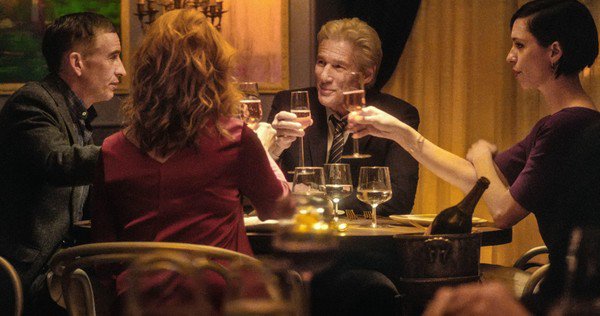
THE DINNER
The Orchard
Reviewed by: Harvey Karten, Shockya
Grade: A-
Director: Oren Moverman
Written by: Oren Moverman, based on the novel by the Dutch author Herman Koch
Cast: Richard Gere, Laura Linney, Steve Coogan, Rebecca Hall, Chloë Sevigny
Screened at: Review 1, NYC, 4/6/17
Opens: May 5, 2017
Fans of Edward Albee’s shattering play “Who’s Afraid of Virginia Woolf” are going to eat “The Dinner” up. “The Dinner” joins the many previous films about family dysfunction but writer-director Oren Moverman handles the thematic content with genuine sophistication. Moverman’s 2009 movie “The Messenger” deals with the ethical struggle of an American soldier when he becomes involved with the widow of a fallen officer is in his métier with “The Dinner.” This latest contribution involves the moral battle of two families whose sons have committed an atrocious crime, one father suggesting that he may hold a press conference to turn in the two criminals, his reasoning opposed by his brother, his wife and his brother’s wife who believe that idealism has its place, but not when your own families are involved. Not only does this release deal with ethics: thematically, Moverman brings in the nature of mental illness, the concept of the trophy wife, and the needs of a weak, cynical, emotionally disturbed man whose wife treats him like a wounded bird—to his disgust.
This superbly acted ensemble brings together Richard Gere in the role of Stan Lohman, a congressman well on his way to becoming the governor of his state; Steve Coogan as his younger brother and former high school history teacher Paul; Laura Linney as Paul’s wife Claire Lohman; and Rebecca Hall as Katelyn Lohman, Stan’s trophy wife. Stan, who would probably answer the biblical Cain’s rhetorical assertion “Am I My Brother’s Keeper”? with a resounding “yes” to Paul’s dismay. Paul has been treated by his wife as a man who needs too much support in order to function, and by his older brother as the emotionally disturbed person that he is. We find out through the incisive dialogue that mental illness runs in the Lohman family, bypassing Stan, the plague resting on Paul’s shoulders.
When Stan invites Paul and Claire to a dinner at the poshest restaurant you can imagine—one in which the mäitre d’ Dylan Heinz (Michael Chernus) serves not only as sommelier but as a man who lectures the foursome about the origin of each dish, we know right off that we are in the hands of a writer-director who can deal equally with satire and with melodrama. It’s difficult to believe that the next governor would have to wait three months for the reservation, but we can easily accept that Paul, who feels vastly inferior to his politician brother. Paul knows, or thinks, that his mother treated Stan as the favored son, that his wife looks down upon him, and must face the contempt of his teen son Michael (Charlie Plummer) who stands up to him, having no problem with cursing his dad out.
After some semblance of civilized discussion, they change tables to a private room where Stan has something to say that could alter six or seven lives irrevocably. Why he would choose a public restaurant to reveal such intimate details, especially in front of Paul’s adviser Nina (Adepero Oduye) is anybody’s guess. Both the sons had committed a terrible crime, the act destined for social media; but so far nobody knows the identity of the perpetrators. Paul is willing to use the nuclear option: destroy his own political career, lose his wife to divorce, create a final break with his brother and sister-in-law, and condemn the young lads to a long term in prison. This is the nature of idealism. The other three disagree with this decision and let him know as forcibly as they can without actually raising weapons. For his part, Paul, quoting from the Civil War battle of Gettysburg (we are actually taken to the scene), decides that he would go to war if necessary to defend his family.
The story is anything but straightforward. Bobby Bukowsky behind the lens photographs within the lavish restaurant and outside, the suburban streets being the playground of teens Michael, Rick (Seamus Davey-Fitzpatrick) and Beau (Miles J. Harvey). They horse around and find the opportunity to deal with a homeless woman inside an ATM with the kind of cruelty that you see publicized now and then whenever the homeless are bullied merely because they are too weak to fight back.
The spot-on performances find Steve Coogan reacting against type, the British actor utilizing a perfect American accept, demonstrating the view of himself as a loser in one of the most authentic performances one can imagine in such a role. His monologue to high school students is the kind of lecture many teachers wish they could get away with. He is contrasted with the character played by Richard Gere, whose puffed-up white hair and puffed-up personality contrast with his brother’s near crew-cut and self-deprecating humor. At the same time Laura Linney affords us with the most superlative job as the wife who wears the family pants and who is the congressman’s equal in debating the ethics of the situation, while for her part Rebecca Hall, acting in a relatively passive state throughout most of the title dinner launches into a harangue against her husband for treating her like a trophy.
For his part Charlie Plummer takes such pride in his malicious crime that the movie audience would probably want to send him away for life, or possibly to Syria. “The Dinner” brings out all the complexities of the novel (available for under $10 at Amazon) at once with cinematic flair and stunning performances.
Rated R. 120 minutes. © Harvey Karten, Member, New York Film Critics Online
Comments, readers? Agree? Disagree? Why?
Story – B+
Acting – A-
Technical – A-
Overall – A-





